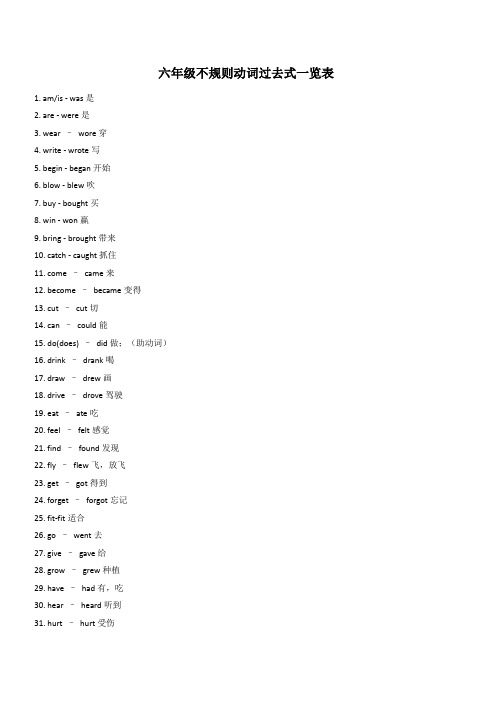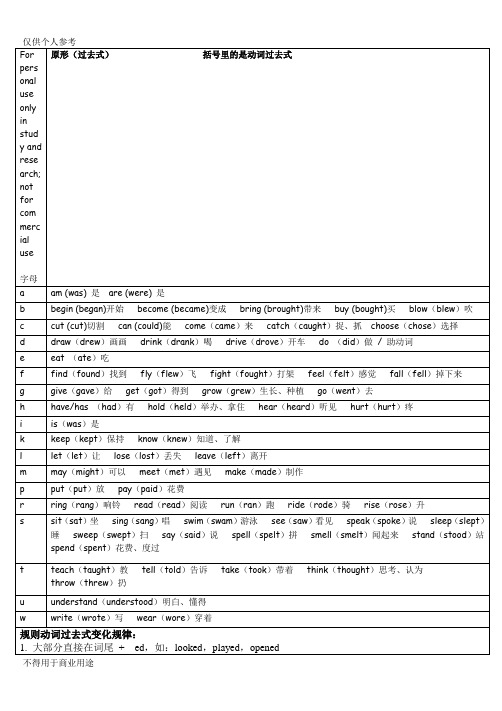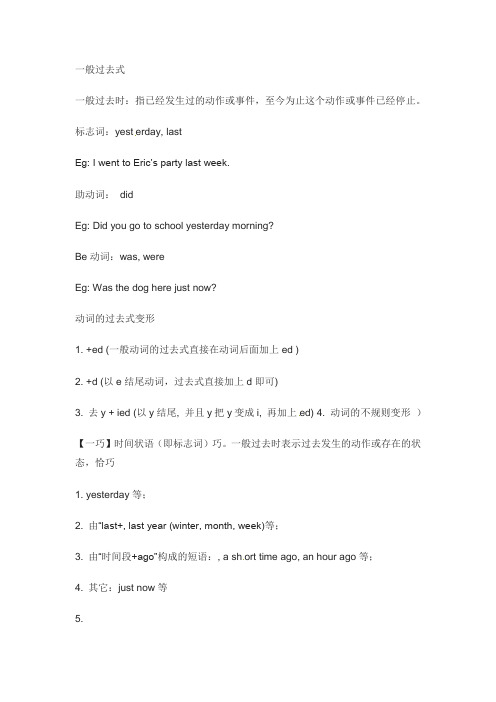译林最新版六年级动词过去式归纳
(译林版)小学英语动词过去式归类总结

小学英语动词过去式归类总结一、动词过去式的规则变化1.一般情况下,动词词尾加-ed如:work ---worked, play---played, want----wanted, act----acted2.以不发音的-e 结尾动词,动词词尾加-d 把动词原形最后的e去掉,加e/ed如:live---lived, move----moved, like--liked, hope---hoped二、动词过去式的不规则变化1. 把动词原形中的o改为a,变成过去式。
如:become—became, come—came2.把动词原形中的i改为a,变成过去式。
如:begin—began,drink—drank,give—gave,ring—rang,sing—sang,sit—sat,swim—swam3.把重读开音节中的i改为o,变成过去式。
如:drive—drove,ride—rode,win—won,write—wrote4.动词原形中的e改为o,变成过去式。
如:get—got,forget—forgot5.动词原形中的eep改为ept,变成过去式。
如:keep—kept,sleep—slept,sweep—swept6. 动词原形中的an改为oo,变成过去式。
如:stand—stood,understand—understood7.改动词原形中的aw /ow为ew,变成过去式。
如:draw—drew,grow—grew,know—knew,throw—threw(动词show除外,show—showed)8.动词原形中的eak改为oke,变成过去式。
如:break—broke,speak—spoke9.动词原形中的ell改为old,变成过去式。
如:sell—sold,tell—told10.以ought和aught结尾,且读音是[:t]的过去式。
如:bring—brought,buy—bought,think—thought,catch—caught,teach—taught11.以ould结尾且读音为[ud]的情态动词过去式。
译林英语 6A一般过去式

一般过去式一般过去时:指已经发生过的动作或事件,至今为止这个动作或事件已经停止。
标志词:yesterday, lastEg: I went to Eric’s party last week.助动词:didEg: Did you go to school yesterday morning?Be动词:was, wereEg: Was the dog here just now?动词的过去式变形1. +ed (一般动词的过去式直接在动词后面加上ed 即可)2. +d (以e结尾动词,过去式直接加上d即可)3. 去y + ied (以y结尾, 并且y旁边没有元音字母的动词,把y变成i, 再加上ed)4. 动词的不规则变形(以下为常用动词的不规则变形,要牢记这些动词哦!)时间状语(即标志词)一般过去时表示过去发生的动作或存在的状态,与表示过去的一些时间状语连用。
1. yesterday或以其构成的短语:yesterday morning(afternoon, evening)等;2. 由“last+一时间名词”构成的短语:last night, last year (winter, month, week)等;3. 由“时间段+ago”构成的短语:a moment ago, a short time ago, an hour ago等;4. 其它:just now等5. 由某些表示过去时态的从句等(1)一般过去时的肯定陈述句:主语+动词过去式+宾语或表语。
He worked in Shanghai ten years ago.(2)一般过去时的否定句:a.主语+ didn’t +动词原形+宾语。
(did + not =didn't)He didn't do morning exercises yesterday.b.主语+ wasn’t/weren’t +表语。
(was + not = wasn't were + not = weren't)He wasn't an English teacher ten years ago.(3)一般过去时的一般疑问句:a.Did +主语+动词原形+宾语?Did you study English in 1990 ?肯定回答用“Yes, 主语+did.”;否定回答用“No,主语+didn’t.”。
牛津译林版六年级英语不规则动词过去式一览表

六年级不规则动词过去式一览表1. am/is - was是2. are - were是3. wear –wore穿4. write - wrote写5. begin - began开始6. blow - blew吹7. buy - bought买8. win - won赢9. bring - brought带来10. catch - caught抓住11. come –came来12. become –became变得13. cut –cut切14. can –could能15. do(does) –did做;(助动词)16. drink –drank喝17. draw –drew画18. drive –drove驾驶19. eat –ate吃20. feel –felt感觉21. find –found发现22. fly –flew飞,放飞23. get –got得到24. forget –forgot忘记25. fit-fit适合26. go –went去27. give –gave给28. grow –grew种植29. have –had有,吃30. hear –heard听到31. hurt –hurt受伤32. keep –kept保持33. know –knew知道34. let –let让35. lose –lost丢失36. make –made制作37. meet –met遇见38. must-must必须39. put –put放40. read –read读41. ride----rode骑42. ring –rang零响43. run –ran跑44. say –said说45. sleep –slept睡觉46. see –saw看见47. sing –sang唱48. sit –sat坐49. stand –stood站50. understand - understood明白51. speak –spoke讲52. swim –swam游泳53. take –took带走;拿走54. teach –taught教55. tell –told告诉56. think –thought想57. leave-left离开双写:1. chat-chatted聊天2. stop-stopped停止3. slip-slipped滑到牢记四个四,学好过去时【语法】一般过去时表示在过去某个时间发生的动作或存在的状态,常与表示过去的时间短语连用。
六年级上册英语素材-动词过去式归纳 句型 译林版

u
understand(understood)明白、懂得
w
write(wrote)写wear(wore)穿着
规则动词过去式变化规律:
1.大部分直接在词尾+ ed,如:looked,played,opened
2.以不发音的e结尾的直接+ d,如:liked,lived,danced,skated,closed
d
draw(drew)画画drink(drank)喝drive(drove)开车do(did)做/助动词
e
eat(ate)吃
f
find(found)找到fly(flew)飞fight(fought)打架feel(felt)感觉fall(fell)掉下来
g
give(gave)给get(got)得到grow(grew)生长、种植go(went)去
肯定句
主语+动词原形/动词三单+其他
I have a computer. I live inBeijing.
He/Shehasa computer.
He/ShelivesinBeijing.
主语+动词过去式+其他
I lived inBeijinglast year.
He/She lived inBeijinglast year.
We went to the book shop yesterday.
He/She went to the book shop yesterday.
否定句
(含有not的句子)
主语+do not/don’t+动词原形+其他
Idon’t havea computer.
译林最新版六年级动词过去式归纳

When do they live in Beijing?
When does he/she live in Beijing?
特殊疑问词+did+主语+动原+其他
When did you live in Bejiing?
Where did you live last year?
Are you a student?
Are there any beautiful clothes?
Was/Were+主语+其他
Was he/she from Beijing?
Were you a student?
Were there any beautiful clothes?
特殊疑问句
特殊疑问词+am/is/a Nhomakorabeae+主语+其他
2.以不发音的e结尾的直接+ d,如:liked,lived,danced,skated,closed
3.辅音加y结尾的变y为i + ed,如:tried,carried,cried,studied
4.以重读闭音节一个辅音字母结尾的动词,双写词尾的辅音字母再加ed(和现在分词规律一样)
如:planned,planned,shopped,stopped,travelled
He/She lived in Beijing last year.
We went to the book shop yesterday.
He/She went to the book shop yesterday.
否定句
(含有not的句子)
主语+do not/don’t+动词原形+其他
苏教译林版英语六年级上册知识点归纳一般过去式_

一般过去式一般过去时:指已经发生过的动作或事件,至今为止这个动作或事件已经停止。
标志词:yest erday, lastEg: I went to Eric’s party last week.助动词:didEg: Did you go to school yesterday morning?Be动词:was, wereEg: Was the dog here just now?动词的过去式变形1. +ed (一般动词的过去式直接在动词后面加上ed )2. +d (以e结尾动词,过去式直接加上d即可)3. 去y + ied (以y结尾, 并且y把y变成i, 再加上ed)4. 动词的不规则变形)【一巧】时间状语(即标志词)巧。
一般过去时表示过去发生的动作或存在的状态,恰巧1. yesterday等;2. 由“last+, last year (winter, month, week)等;3. 由“时间段+ago”构成的短语:, a sh ort time ago, an hour ago等;4. 其它:just now等5.(1主语+宾语或表语。
(2a.主语t +动词原形+宾语。
(did + not =didn't)exercises yesterday.b.主语+wasn’t/weren’t +表语。
(was + not = wasn't were + not = weren't) He wasn't an English teacher tenyears ago.(3)一般过去时的一般疑问句:a.Did +主语+动词原形+宾语?Did you study English in 1990?肯定回答用“Yes, 主语+did.”;否定回答用“No,主语+didn‟t.”。
b.Was/Were + 主语+表语?Was he a pupil five years ago ?肯定回答用“Yes, 主语+was/were.”;否定回答用“No,主语+wasn't/weren't.”。
译林版)小学英语动词过去式归类总结
译林版)小学英语动词过去式归类总结XXXI。
Regular XXX XXX1.In general。
add -ed to the end of the verb.Examples: work --- worked。
play --- played。
want --- wanted。
act --- acted2.For verbs ending in silent -e。
add -d and remove the final -e。
then add -e/-ed.Examples: live --- lived。
move --- moved。
like --- liked。
hope --- hopedII。
XXX XXX1.Change the -o in the base form to -a to form the past tense.Examples: e --- became。
come --- came2.Change the -i in the base form to -a to form the past tense.Examples: begin --- XXX。
drink --- drank。
give --- gave。
ring --- rang。
sing --- sang。
sit --- sat。
swim --- swam3.Change the -i in the XXX to -o to form the past tense.Examples: drive --- drove。
ride --- rode。
win --- won。
write --- wrote4.Change the -e in the base form to -o to form the past tense.Examples: get --- got。
et --- ot5.Change the -eep in the base form to -ept to form the past tense.Examples: keep --- kept。
译林版英语六年级下册一般过去时的用法
一般过去时一.动词过去式的构成1、一般在动词原形末尾加edhelp → helped, look → looked, play → played, work → worked, listen → listened,2、结尾是 e 的动词加dlive---lived ,hope---hoped ,use---used ,like --- liked3、以“辅音+元音+辅音”结尾的动词,一般先双写这个辅音字母,再加—edstop---stopped,plan---planned4、结尾是“辅音字母+y”的动词,先变“y”为“i”再加edstudy---studied carry ---carried cry --- cried worry → worried★★注: be动词的过去式:am, is---was , are----were5. 特殊动词过去式(必须背诵)begin 开始——began buy 买——boughtcan 能——could come 来——camedo 做——did draw 画画——drewdrink 喝——drank drive 驾车——droveeat 吃——ate feel 感觉——feltfind 找寻——found fly飞——flewforget 忘记——forgot get 得到——gotgive 给予——gave go 去——wentgrow 成长——grew have 有——hadhear 听——heard keep 保持——keptknow 知道——knew learn学习—learnt, learnedlet 让——let make 做——mademeet 见面——met must 必须——mustput 放——put read 读——readride 骑——rode run 跑——ransay 说——said see 看见——sawsing 唱歌——sang sit 坐——satsleep 睡觉——slept speak 讲话——spokespend 花钱——spent stand 站立——stoodsweep 打扫——swept swim 游泳——swamtake 拿到——took teach 教——taughttell 讲述——told think 思考——thoughtwill 意愿——would write 写——wrotebite咬---bit hit敲打---hit二.一般过去时的标志有:just now刚刚 a moment ago片刻之前 yesterday last week last night last weekend last year last month three days ago two weeks agofive years ago this morning今早 at that time, at that moment那时三.一般过去时的构成1.含有be动词的一般过去时(1) 肯定句:主语+was/were+其他成分My book was there just now 我的书刚刚在那儿的。
新译林 6A 过去式动词变形
一般过去时6A Unit1-4基本概念:一般过去时表示①过去某个时间里发生的动作或状态;②过去习惯性、经常性的动作、行为;③过去主语所具备的能力和性格。
时间定位:一般过去时的句子中,常含有过去的时间状语,如:just now刚才yesterday 昨天yesterday afternoon昨天下午last night昨晚last Thursady上个星期四last week上个星期last month上个月last term上个学期the day before yesterday 前天an hour ago一小时前 a week ago一个星期前many years ago多年前;很久以前long long ago很久很久以前(同义词组:once upon time ago long time ago ◆long before特别注意before long是不久以后)◆five days ago五天前before曾经、以前in the past在过去★in+过去的年份—in 2013在2013年,in 2002在2002年(相对于目前的2014年是逝去的时间,所以是过去的时间范畴,因此动词要使用ed型进行表达) 等。
★也可以通过其他句子表现出是过去的:When I was 5 years old … 当我5岁的时候…★一般过去时也常和always usually often sometimes等这些仅仅是表示频率的时间状语连用,表示过去经常或反复发生的动作。
一个时态,两条主线:Be 型He was a child ten years ago. (表示过去的状态)实义动词He always went to work by bus last year. 去年他总是乘公共汽车上班。
(表示过去的动作)When I was a boy, I often went to play in the park. 当我是小孩子时, 常去那个公园玩。
牛津译林版六年级英语不规则动词过去式一览表
六年级不规则动词过去式一览表1. am/is - was是2. are - were是3. wear –wore穿4. write - wrote写5. begin - began开始6. blow - blew吹7. buy - bought买8. win - won赢9. bring - brought带来10. catch - caught抓住11. come –came来12. become –became变得13. cut –cut切14. can –could能15. do(does) –did做;(助动词)16. drink –drank喝17. draw –drew画18. drive –drove驾驶19. eat –ate吃20. feel –felt感觉21. find –found发现22. fly –flew飞,放飞23. get –got得到24. forget –forgot忘记25. fit-fit适合26. go –went去27. give –gave给28. grow –grew种植29. have –had有,吃30. hear –heard听到31. hurt –hurt受伤32. keep –kept保持33. know –knew知道34. let –let让35. lose –lost丢失36. make –made制作37. meet –met遇见38. must-must必须39. put –put放40. read –read读41. ride----rode骑42. ring –rang零响43. run –ran跑44. say –said说45. sleep –slept睡觉46. see –saw看见47. sing –sang唱48. sit –sat坐49. stand –stood站50. understand - understood明白51. speak –spoke讲52. swim –swam游泳53. take –took带走;拿走54. teach –taught教55. tell –told告诉56. think –thought想57. leave-left离开双写:1. chat-chatted聊天2. stop-stopped停止3. slip-slipped滑到牢记四个四,学好过去时【语法】一般过去时表示在过去某个时间发生的动作或存在的状态,常与表示过去的时间短语连用。
- 1、下载文档前请自行甄别文档内容的完整性,平台不提供额外的编辑、内容补充、找答案等附加服务。
- 2、"仅部分预览"的文档,不可在线预览部分如存在完整性等问题,可反馈申请退款(可完整预览的文档不适用该条件!)。
- 3、如文档侵犯您的权益,请联系客服反馈,我们会尽快为您处理(人工客服工作时间:9:00-18:30)。
原形(过去式)括号里的是动词过去式
a
am (was) 是 are (were) 是
b
begin (began)开始 become (became)变成 bring (brought)带来 buy (bought)买 blow(blew)吹
c
cut (cut)切割 can (could)能 come(came)来 catch(caught)捉、抓 choose(chose)选择
一般现在时和一般过去时的几种句型比较
时态
一般现在时
一般过去时
肯定句
主语+动词原形/动词三单+其他
I have a computer. I live in Beijing.
He/Shehasa computer.
He/Shelivesin Beijing.
主语+动词过去式+其他
I lived in Beijing last year.
常见的过去式时间状语:
…ago, before…, last…, yesterday, the day before yesterday, a moment ago, just now,
this morning/afternoon, at that time, at that moment, one day, that day,…
d
draw(drew)画画 drink(drank)喝 drive(drove)开车 do (did)做 / 助动词
e
eat (ate)吃
f
find(found)找到 fly(flew)飞 fight(fought)打架 feel(felt)感觉 fall(fell)掉下来
g
give(gave)给 get(got)得到 grow(grew)生长、种植 go(went)去
Did+主语+动原+其他
Didyoulivein Beijing last year?
Didhe/shelivein Beijing last year?
Didtheygoto the book shop yesterday?
特殊疑问句
特殊疑问词+do/does+主语+动原+其他
What do you have?
2. 以不发音的e结尾的直接+ d,如:liked,lived,danced,skated,closed
3. 辅音加y结尾的变y为i + ed,如:tried,carried,cried,studied
4. 以重读闭音节一个辅音字母结尾的动词,双写词尾的辅音字母再加ed(和现在分词规律一样)
如:planned,planned,shopped,stopped,travelled
He/Shedidn’t livein Beijing last year.
Wedidn’t goto the book shop yesterday.
一般疑问句
(用yes和no来回答的问句)
Do/Does+主语+动原+其他
Doyouhavea computer?
Doeshe/shehaveacomputer?
What does he/she have?
When do they live in Beijing?
When does he/she live in Beijing?
特殊疑问词+did+主语+动原+其他
When did you live in Bejiing?
Where did you live last year?
p
put(put)放 pay(paid)花费
r
ring(rang)响铃 read(read)阅读 run(ran)跑 ride(rode)骑 rise(rose)升
s
sit(sat)坐 sing(sang)唱 swim(swam)游泳 see(saw)看见 speak(spoke)说 sleep(slept)睡 sweep(swept)扫 say(said)说 spell(spelt)拼 smell(smelt)闻起来 stand(stood)站spend(spent)花费、度过
h
have/has (had)有 hold(held)举办、拿住 hear(heard)听见 hurt(hurt)疼
i
is(was)是
k
keep(kept)保持 know(knew)知道、了解
l
let(let)让 lose(lost)丢失 leave(left)离开
m
may(might)可以 meet(met)遇见 make(made)制作
+ed 后的发音
1. /d/ 大部分浊辅音后面加ed念 /d/
2 / t / 大部分轻辅音后面加ed/念t/ ch, sh ,p, pe, k, ke, s, h, f 结尾一般为轻辅音。
3. /Id/ d, de, t, te 结尾加ed 念 /Id/ planted collected pointed shouted visited wanted invented protected needed, skated
Idon’t livein Beijing.
(三单)主语+does not/doesn’t+动原+其他
He/Shedoesn’t havea computer.
He/Shedoesn’t livein Beijing.
主语+did not/didn’t+动原+其他
I didn’t live in Beijing last year.
He/She lived in Beijing last year.
We went to the book shop yesterday.
He/She went to the book shop yesterday.
否定句
(含有not的句子)
主语+do not/don’t+动词原形+其他
Idon’t havea computer.
t
teach(taught)教 tell(told)告诉 take(took)带着 think(thought)思考、认为
throw(threw)扔
u
understand(understood)明白、懂得
w
write(wrote)写 wear(wore)穿着
规则动词过去式变化规律:
1. 大部分直接在词尾 + ed,如:looked,played,opened
